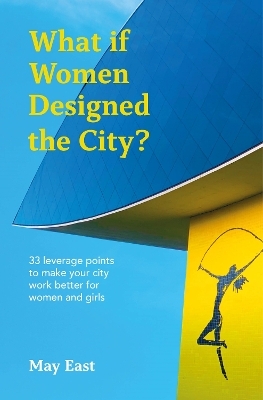
What if Women Designed the City?
Triarchy Press (Verlag)
978-1-913743-87-1 (ISBN)
Dr. May East here explores the set of symbiotic relationships between women and the cities they live and work in. She considers how cities would look if they were designed by women, and how that design (or redesign) could help to achieve the dream of regenerative urban neighbourhoods.
What if Women Designed the City? offers a fresh perspective on urban development by giving voice to local women from many different countries and backgrounds and it reveals multiple untapped potentials rooted in the uniqueness of their neighbourhoods.
The book builds on the core assumption that women can contribute significantly more to urban planning decisions and implementation, and in doing so enrich and add value to urban environments and specifically to their own neighbourhoods.
Drawing on in-depth walking interviews with 274 women, May East identifies 33 leverage points that can enable urban planners, policy-makers, practitioners, and communities to intervene in urban planning systems so that cities can be greener, more inclusive, more liveable, and even poetic!
May East was born in Sao Paulo and now lives in Edinburgh. She is an international urbanist and regenerative practitioner bringing vitality and viability to eco-communities, mining cities, indigenous villages, informal settlements, transition and ghost towns. She currently works with local & regional government, private sector and intergovernmental agencies providing policy guidance for initiatives aimed at enhancing gender-sensitive urban planning, decreasing carbon emissions, establishing sovereign wealth funds, and developing symbiotic eco-industrial parks. May's career portfolio spans diverse disciplines and areas of interest. She comes from a thriving artistic community between Sao Paulo and Rio de Janeiro where for over a decade, her art, be it in music, film or video, expressed a deep concern for all of Brazil's diverse environments, both in the major cities and the country's vast interior, especially the Amazonian rainforests. Associated with UNITAR for two decades, May currently serves as Advisory Member of the Division for People and Social Inclusion. She is a specialist in promoting vertical integration between community-led solutions to climate resilience and national & international donors, and the UN system and conventions. She holds a Master of Science in Spatial Planning with specialization in the rehabilitation of abandoned villages and towns, and a PhD in Architecture and Urban Planning with the University of Dundee on the topic What if Women Designed the City?. May was designated as one of the 100 Global SustainAbility Leaders three years in a row and Women of the Decade in Sustainability and Leadership by Women Economic Forum.
Foreword 1
Foreword 2
Preface
1 | The Context
2 | Women and Cities: A Co-Evolving Mutualism Perspective
3 | Systems Thinking for Urban Systems Change
4 | Leverage Points: Places to Intervene in a System
5 | Regenerative Design Bringing Vitality to Urban Systems
6 | Mapping Women's Presency through Walking Interviews
7 | 33 Leverage Points (LP) to make your city Work Better for Women and Girls
1 - Cultivating Biophilia
2 - Developing Spaces for Gathering and Belonging
3 - Designing Urban Extensions while Evolving the Whole
4 - Shifting from a mentality of maintenance to an attitude of care
5 - Redistributing land use and budget allocation for
equality and gendered landscapes
6 - Creating conditions for wildness
7 - Devising a library of women-tailored bike saddles
8 - Growing and foraging for health and well-being
9 - Designing adventurous playgrounds for children and carers
10 - Working with men to redistribute power, balance representation and transform legal and planning systems
11 - Building confidence through easy to access self-defence training and seminars on rights of women and domestic violence
12 - Improving natural surveillance by design
13 - Scheduling regular patrol walks by wardens who belong
14 - Making Practical Cycle Awareness Training mandatory for
drivers
15 - Encouraging active travel as a way of life
16 - Rethinking the bus fare system for trip-chaining and redesigning buses for encumbered travel
17 - Designing fresh air routes and low emissions zones from women's and infants perspectives
18 - Promoting earlier interventions and co-creating values-based educational pathways
19 - Expanding the use of public space in the evenings by creating bio-cultural-spatial conditions
20 - Co-developing sympathetic infrastructure enabling a sense of co-ownership and care
21 - Maximising use of available local resources available in urban interventions
22 - Practicing a culture of deep listening in the design and development of local plans
23 - Fostering regenerative tourism that enhances the bio-cultural-spatial uniqueness of place
24 - Adopting 20-Minute neighbourhoods
25 - Co-creating transitional safeguarding public spaces for young women
26 - Combining gender and nature-based approaches as strategy to transform urban environments
27 - Infusing beauty in cities form and function
28 - Reconnecting Broken Links
29 - Promoting schemes on electric bicycles usership
30 - Refurbishing pavements to accommodate high heels
31 - Delineating and flowing through cycling infrastructure
32 - Purpose-building intergenerational housing
33 - Co-designing Places with (not only for) teenage girls
8 | Bridging the Gender Gap in Urban Planning
9 | Afterword: Storylines
Glossary of Terms
Categorisation of 33 Leverage Points
Bibliography
| Erscheinungsdatum | 17.11.2023 |
|---|---|
| Zusatzinfo | 10 line drawings |
| Verlagsort | Bridport |
| Sprache | englisch |
| Maße | 140 x 210 mm |
| Themenwelt | Naturwissenschaften ► Geowissenschaften ► Geografie / Kartografie |
| Sozialwissenschaften ► Soziologie ► Gender Studies | |
| Technik ► Architektur | |
| ISBN-10 | 1-913743-87-X / 191374387X |
| ISBN-13 | 978-1-913743-87-1 / 9781913743871 |
| Zustand | Neuware |
| Informationen gemäß Produktsicherheitsverordnung (GPSR) | |
| Haben Sie eine Frage zum Produkt? |
aus dem Bereich


